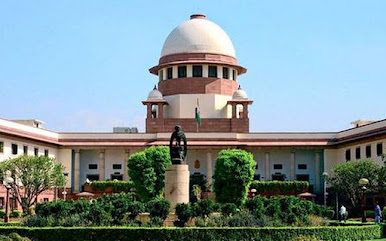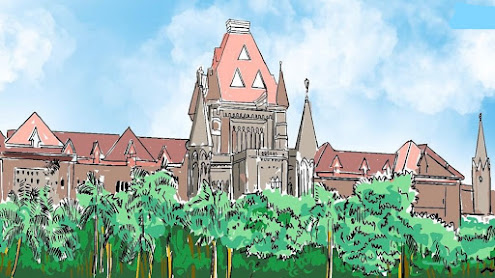The Supreme Court is set to hear a petition filed by Adv. Prashant Bhushan seeking the establishment of an "intra-court appeal" mechanism to larger benches of the court in cases of contempt.
Petition of Adv. Nilesh Ojha, Adv. Vijay Kurle & Rashid Khan Pathan are also tagged together.
Bench
of Justice Sanjiv Khanna Justice & Justice M.M. Sundresh will hear the
case. [Matter listed at Sr. No. 44.]
Rashid
Khan Pathan had prayed for reference of matter to Constitution Bench as
question of interpretation of constitutional mandate is alleged.
Adv.
Nilesh Ojha submitted written submissions for forwarding the reference to
Constitutional Bench. He pointed out that there are conflicting decisions of
the Supreme Court which is creating confusion.
Ojha
cited the cases of conviction, sentence and detention of Subrato Roy Sahara,
Zahira Shaikh, Perry Kansangra etc. which is beyond the limit of section 12 of
the Contempt of Courts Act, 1971 and clear violation of Article 20(1) of the
constitution and Article 15 of the International
Covenant on Civil and Political Rights (ICCPR).
His
submission also point out that despite the fact that the constitutional
validity of the Contempt of Courts Act, 1971 is already upheld by the larger
Benches of the Supreme Court and a
contrary judgment of a two Judge Bench in Pritam
Pal’s case 1993 Supp (1) SCC 529 is overruled by the three – Judge
Bench in Bal Thackrey’s case (2005) 1
SCC 254, few of the Benches of the Supreme Court are still following
the said judgment and convicting the people on the basis of overruled judgment
and confusion is being created amongst Lawyers, people and the Judges of Sub
ordinate Courts and in result the majesty and dignity of this Hon’ble Court is coming to disrepute.
He
point out that the judgment in C. K.
Daphtary Vs. O.P. Gupta (1971) 1 SCC 626 is a per incuriam and later
statutory overruled judgment and clear verdict to that effect is given by the
Supreme Court in P.N. Duda’s case
(1988) 3 SCC 167 & Biman Basu v. Kallol Guha Thakurta, (2010) 8 SCC 673.
Furthermore after the 2006 amendment and Constitution Benche’s judgment in Re: C.S. Karnan (2017) 7 SCC 1 &
Subramanian Swamy v. Arun Shourie,
(2014) 12 SCC 344, the judgment in C.
K Daphtary’s case (1971) 1 SCC 626 had lost its value as a precedent.
Then
also the petitioner including Adv. Prashant Bhushan were convicted and sentenced
by relying the ratio laid down such judgment.
The
questions that arise for consideration in these matters are of general public
importance. Hence
there is a need of an authoritative pronouncement by the
Constitution Bench of 7 or 9 Judges to clear the cloud.
Earlier
in the case of Dr. Subramanian Swamy v. Arun Shourie (2000) 10 SCC
331, a three Judge Bench of this Hon’ble Court in a proceeding under
contempt had referred a matter of allowing truth as a defence and the issue that the decision of the
supreme Court needs reconsideration to the Constitutional Bench by observing
that the questions that arise for consideration in these matters are of general
public importance which are required to be considered by a Constitution Bench.
The
written submission takes a reference of para 22 of the judgment in Sundarjas Kanyalal Bhatija v. Collector,
Thane, (1989) 3 SCC 396, as under;
“22 […] In our system of judicial review which is a part of our constitutional
scheme, we hold it to be the duty of
judges of superior courts and tribunals to make the law more predictable.
The question of law directly arising in the case should not be dealt with
apologetic approaches. The law must
be made more effective as a guide to behaviour. It must be determined
with reasons which carry convictions within the courts, profession and public. Otherwise, the lawyers would be in a
predicament and would not know how to advise their clients. Subordinate courts
would find themselves in an embarrassing position to choose between the
conflicting opinion. The general public would be in dilemma to obey or not to
obey such law and it ultimately falls into disrepute.”
ON THE ISSUE OF INTRA
COURT APPEAL:-
Ojha
pointed out that it is
fundamental right to one appeal against the order of conviction in
contempt cases by this Supreme Court in
its original jurisdiction. Non providing appeal is violation of Article 14
(5) of International Covenant on Civil & Political Rights (ICCPR)
Article 14, 19 & 21 of the Constitution of India.
Article 14 (5) of ICCPR reads thus;
“5. Everyone convicted of a crime
shall have the right to his conviction and sentence being reviewed by a higher
tribunal according to law.”
Nine
Judges Bench of this Hon’ble Court in the case of K. Putaswamy vs. UOI
(2017) 10 SCC 1, had specifically ruled that the provisions of ICCPR
and other international Covenants are constitutionally protected under our
constitution and its violation can be challenged in the same manner as a
violation of fundamental rights guaranteed under constitution of India.
That, the
ratio laid down in a recent judgment of
Five – Judge Bench of UK Supreme Court in the case of Her Majesty’s
Attorney General Vs. Crossland [2021] USKC 58, support the prayers of
the petitioners. It is held by the UK Supreme Court that the person convicted
by the Supreme Court under contempt in its original jurisdiction had a right of
one appeal before larger benches.
Sanyal
Committee report while enacting Contempt of Courts Act,1971 had taken a reference
of the observations of
Shawcross Committee which are as
under ;
“…….. in
every system of law of any civilized State, there is always a right of appeal
against any sentence of imprisonment”. There is no justification whatsoever for
making any exception to this universally recognised principle in the case of
sentences for contempt. ”
Similar is
the ratio laid down in the case of Madav Haskot Vs. State (1978) 3 SCC
544 & Dilip S. Dahanukar Vs. Kotal Mahindra Co. Ltd. (2007) 6 SCC 528.
A 17-Judge Bench of United Nations Human
Rights Committee comprising Justice P.N. Bhagwati in the case of Anthony Michael
Emmanuel Fernando v. Sri Lanka, 2005 SCC OnLine HRC 22 had strongly condemned
the conviction of imprisonment in contempt by the Chief justice of the Supreme Court of Srilanka and
declared it to be arbitrary, draconian and inappropriate and violative of Art. 9
of ICCPR. The committee in many such cases had directed the State authority to
pay compensation to the citizen and
provide them an appellate jurisdiction against the conviction by the
Supreme Court in its original jurisdiction.
The other
landmark judgments are;
(i) Luis Hens Serena v. Spain, 2008
SCC OnLine HRC 20
(ii) Chota Ratiani Vs. Georgia 2005 SCC OnLine
HRC 25 (Para
11.3 & 12).
(iii) Luis
Olivero Capellades Vs. Spain 2006 SCC OnLine HRC 42 (Para 7 &
8).
(iv) Terron v. Spain, Comm. 1073/2002, U.N. Doc. A/60/40, Vol. II, at 111 (HRC 2004)
You can download a copy of the written
submission here.
.png)


.jpg)
Comments
Post a Comment